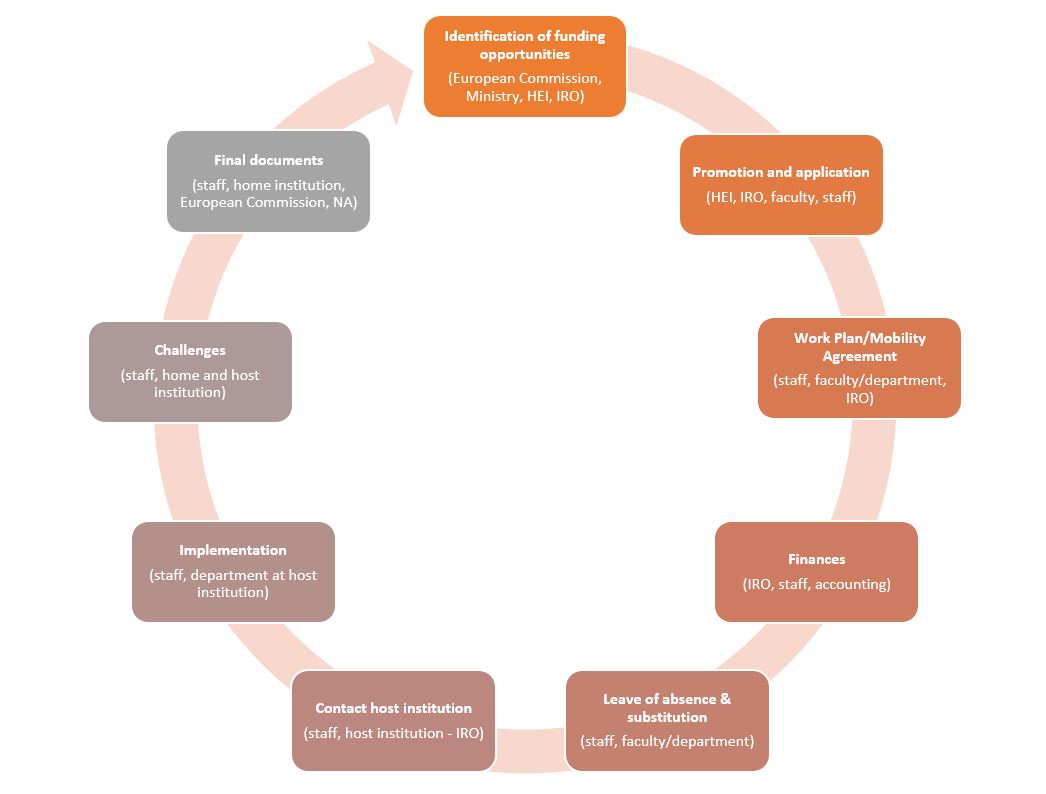The University of Graz is one of the leading universities in Austria when it comes to implementing student and staff mobility with partner institutions in Europe and around the world. A central element in its internationalization strategy is the mobility of academic and non-academic staff. The University of Graz can draw on extensive experience concerning the administration of staff mobility in all its various aspects. This text describes the staff mobility ‘life cycle’ at the University of Graz as an example of good practice.
Staff mobility life cycle at the University of Graz
The University of Graz is involved in a number of mobility funding programmes of different scopes and designs, but most of the staff mobility to and from the university happens through the Erasmus+ programme. The Erasmus Charter for Higher Education (ECHE) constitutes the overall quality framework in which Erasmus+ mobility is implemented and defines, amongst other things, the principles which govern this implementation.
Staff mobility participants have to meet several eligibility requirements according to the stipulations of the funding programme. This includes, for example, teaching a minimum number of hours during the stay abroad. A detailed work plan is set up beforehand in which the staff and the home and host universities (often referred to as the sending and receiving universities) agree on the activities for the mobility period.
In the Erasmus+ programme, staff selected to participate receive a grant to cover travel and living costs. Following the completion of the teaching or training assignment abroad, they have to hand in a confirmation of stay from the host university and submit an online survey. At the University of Graz, staff going abroad are eligible for a leave of absence for the duration of their stay abroad. It is the responsibility of individual staff members, however, to ensure that their obligations at the home university are fulfilled despite their absence. This might involve asking colleagues to cover their lectures or making up for lectures before or after the mobility placement. All this needs to be organized in advance.
At the University of Graz, mobility programmes are promoted via newsletters, brochures, events (such as orientation programmes for new staff), personal consultation and word of mouth. While mobility programmes are well received by staff at the University of Graz, there are also challenges which staff wanting to go abroad need to be prepared to tackle. These include defining specific activities for the stay abroad which suit both the staff member and the universities involved, matching academic calendars and planning absences during the semester.
When it comes to incoming staff, the International Relations Office at the University of Graz is usually the first contact point for international colleagues who want to visit for teaching and/or training purposes but do not have personal contacts. The Office provides support in establishing contact with potential hosts by forwarding expressions of interest to departments and units working in the areas matching the profiles of the potential visitors. The departments and units concerned then assess whether there is a match between what the international colleague is looking for and what they can offer in terms of resources and expertise. It is important to ensure that a visiting colleague can be integrated meaningfully at the host institution and provided with the necessary support. If a department or unit at the University of Graz endorses the incoming mobility, a detailed work plan with activities for the duration of the mobility is drawn up by the incoming staff member and the home and host universities.
Overall, implementing staff mobility involves a whole ‘life cycle’ of different phases. The following graphic illustrates this cycle for outgoing staff mobility at the University of Graz, including the units and people involved in the process – from the identification of possible funding sources through to documentation of the mobility initiative.

In the first step, it needs to be determined, e.g. by the International Relations Office, what kind of funding opportunities are offered by the respective authorities, e.g. European Commission and Ministry of Education. The funding programmes available are then promoted within the university by the International Relations Office in cooperation with the faculties and departments. Detailed programme information is provided (e.g. application requirements, selection criteria, finances, etc.) in order to ensure a transparent application and selection procedure. Interested staff members apply by a clearly communicated deadline. Following the allocation of funding to individual mobility flows, the staff members devise a work plan together with the faculty/department at the home and host institutions. Then they need to agree on a suitable time frame, obtain leave of absence and make the necessary practical arrangements, which includes coordinating tasks with colleagues and/or rescheduling obligations and assignments at the home university for before or after the mobility. After their stay abroad, returning staff members have to hand in specific documents (e.g. a confirmation of stay issued by the host university) and report on their mobility experience (e.g. through online reports). The International Relations Office offers support throughout the process and manages the financial aspects with the Finance Department.
References
• European Commission Erasmus+ Website
https://ec.europa.eu/programmes/erasmus-plus/resources/documents/applicants/higher-education-charter_en (accessed 01.08.2018)


